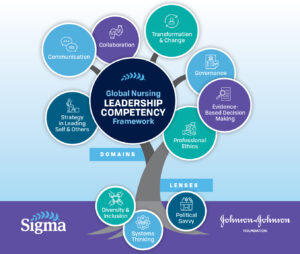This weeks’ blog focuses on Leadership Development and is by Katarzyna (Kasia) Czabanowska, Prof, Dr @KatarzynaCzaba1, Emily McWhirter, PhD, RN @McWhirterEmily and Barbara Stilwell, PhD, MSC, FRCN, FAAN @bathebrit
Nurses and midwives make up 50% of the world’s healthcare workforce but remain severely under-represented in senior leadership1. To address this longstanding concern, we have sought to develop a framework of future-oriented leadership competencies based on evidence of globally acceptable effectiveness. This has been done using a multi-stage research and review process over two years, with the support of the Johnson & Johnson Foundation and in collaboration with representatives of global nursing organizations and universities, led by Sigma Theta Tau International Honor Society of Nursing (Sigma).
With the support of a master’s prepared librarian, a literature search identified any leadership frameworks from health care and the health-related arenas that had been tested for evidence of effectiveness. Surprisingly (to us, the core team, and the authors of this blog), only 26 papers were found in the healthcare leadership literature based on evidence rather than expert opinion. The 26 papers were further reviewed, and ten were deemed relevant to this work, offering competency-based frameworks. The frameworks underpinning the work were from nursing and other healthcare fields, including leadership frameworks from various countries. Of these ten articles, three were specific to nursing, while the others were more generally for health professions. Two had been developed for global use, and the remaining were developed and used nationally. We used the ten articles to identify broad categories that they had in common, which were both future-facing and applicable to nursing leadership in the changed world following the COVID-19 pandemic. Similar themes were grouped and identified as seven domains: strategy in leading self and others, collaboration, communication, transformation and change, governance, professional ethics, and evidence-based decision-making.
Other areas were identified that we thought were critical to nurse leaders, and we called these lenses. The lenses are the perspective through which to view the domains: diversity and inclusion, political savvy, and systems thinking. These provide a future orientation to the more traditional leadership domains, as they address emerging issues vital to health systems development and, therefore, to nursing, as the profession tackles today’s health issues2. Health professionals need to be equipped with leadership skills to help them effectively address these challenges to improve the health and well-being of their patients, communities, and societies that they serve3.
We then developed competencies for each domain and lens and asked a group of 14 subject matter experts (SMEs) who were selected from global nursing organizations, higher education settings for nurses and high-level clinical practice settings, to rate them for relevance and importance. The SMEs provided invaluable feedback on wording, relevance, and categorization. We asked each of the SMEs to recommend five other colleagues to review the revised competencies. Two rounds of a Delphi survey gave us further feedback from a truly global group. Some words were changed to make the competencies more comprehensible to non-English speakers, and there was some debate about relevance. But it all provided valuable feedback for the core team and this process of consultation was one of the most exciting phases of the development. After another round of revisions by the core team based on the Delphi feedback, the core team provided behavioral indicators for each competency at four levels: novice, competent, expert and luminary.
At present, the Global Nurse Leadership Competency Framework is being tested. The intent is that this becomes and remains a living document and will be revised based on user feedback. To ensure the framework has global reach, it is available in eight (8) languages: Arabic, Chinese, English, French, German, Portuguese, Russian, and Spanish. The leadership competency framework can be found here (www.sigmanursing.org/gnlcf). The framework is free to any nurse anywhere in the world and we ask for feedback so that this framework becomes a living document and builds our leadership knowledge.
The framework can be used for self-assessment by individual nurses, organizations, and schools of nursing developing or revising their leadership programs and by employers to support the leadership development of their staff. The leadership competency framework offers an evidence-based approach that will help nurses everywhere develop the skills and confidence needed to become compassionate, thoughtful, and innovative leaders and make valuable contributions to our global commitment to universal health coverage. Now is the time for the nursing profession to take charge of leadership development, as our contributions are needed more than ever. We look forward to seeing how much we can achieve together through effective and competent leadership.
References
- WHO Expert Committee on Nursing: third report. Geneva: World Health Organization; 1954:4 (WHO Technical Report Series, No. 91). https://iris.who.int/handle/10665/39846
- Health Workforce UHL (2020). State of the world’s nursing. https://www.who.int/publications/i/item/9789240003279
- Rodríguez-Feria P, Czabanowska K, Babich S, Rodríguez-Sánchez D, Carreño Hernández FL and Hernández Flórez LJ (2023) Divergence and Convergence of the Public Health Leadership Competency Framework Against Others in Undergraduate Medical Education: A Scoping Review. Public Health Rev. 44:1605806. https://doi.org/10.3389/phrs.2023.1605806
This blog is part of a series in collaboration with the International Network for Health Workforce Homepage | International Network for Health Workforce Education (inhwe.org)
